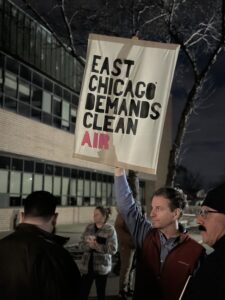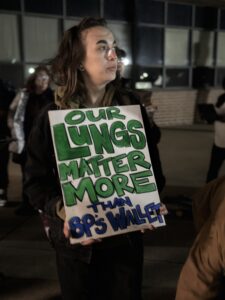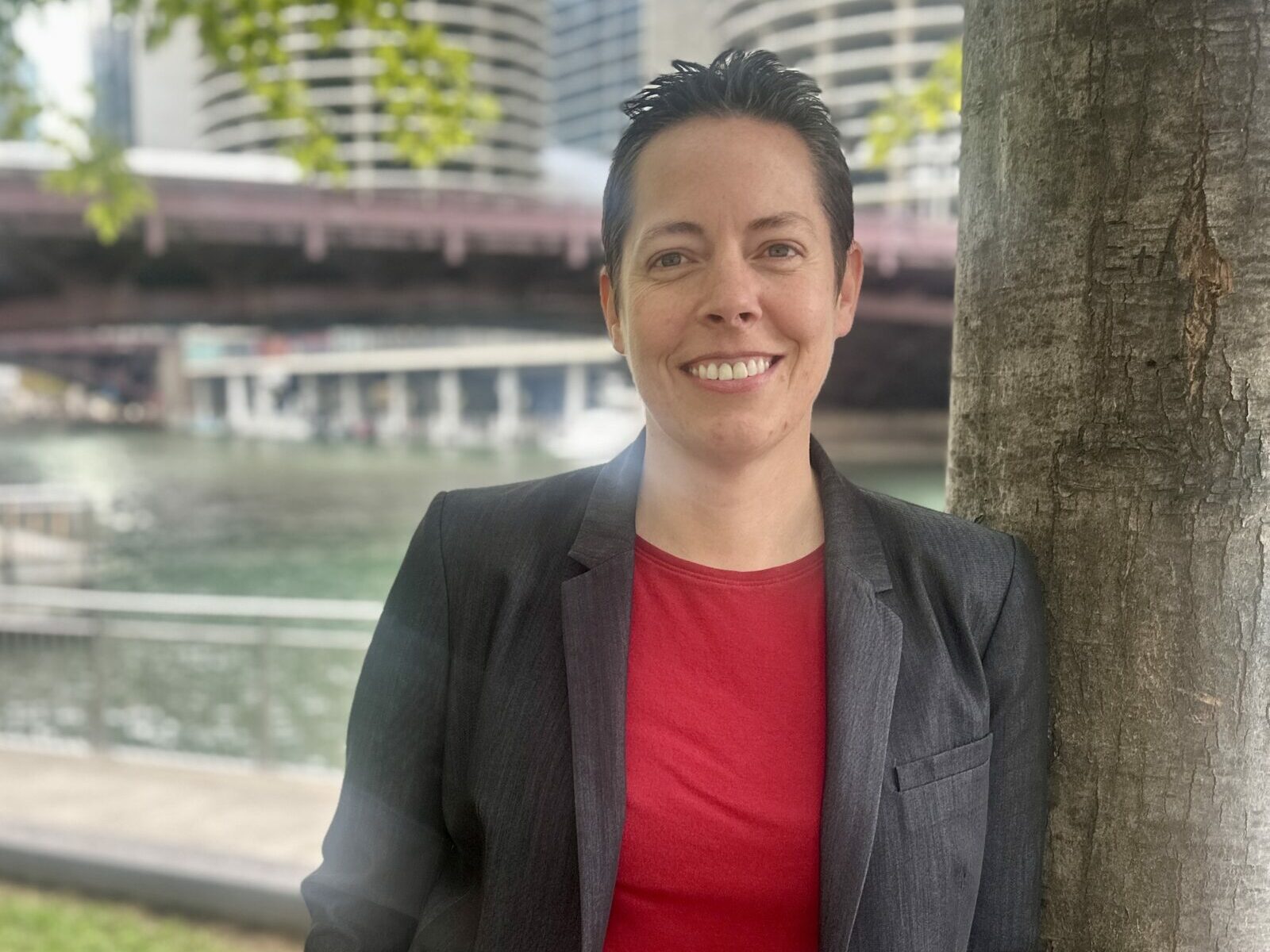BP Whiting flares, Jan 2024
February 15, 2024
“They Set the Skies on Fire”: Working to Rein in BP Whiting Refinery’s Air Pollution
After a series of leaks and flares in recent weeks, community members are fighting to tighten air permits at a northwest Indiana refinery.

Residents shut out of the IDEM meeting on February 8
The BP petroleum refinery in Whiting, Indiana is one of the largest in the country, with dozens of separate emissions sources. So, when something goes wrong, it can have a big impact on local air quality. That’s exactly what happened this winter, as a series of leaks caused by equipment failures, as well as a power outage, resulted in the release of multiple chemicals, sky-high flames, and smoke for miles. Two separate tank leaks, one on January 18 and another on January 23, spread a strong chemical odor across the region from benzene and hydrogen sulfide, including into nearby communities in Illinois. This was followed by a power outage on February 1, which forced an evacuation of nonessential personnel from the refinery, shutdown access to nearby roads, and has left the flares burning off excess product 24/7 since.
 It just so happens that BP’s air permit is up for review. The Indiana Department of Environmental Management (IDEM) has an opportunity to hold BP accountable for reining in pollution and fixing internal processes so equipment failures like this don’t happen again. Unfortunately, the public meeting IDEM planned for February 8 to discuss the proposed permit was cancelled at the last minute. ELPC staff were among the 100+ community members waiting outside East Chicago Central High School when they got shut out in the cold. Fortunately, a new meeting has been scheduled for Thursday, February 22, 2024, and you can bet that community members will be out in force.
It just so happens that BP’s air permit is up for review. The Indiana Department of Environmental Management (IDEM) has an opportunity to hold BP accountable for reining in pollution and fixing internal processes so equipment failures like this don’t happen again. Unfortunately, the public meeting IDEM planned for February 8 to discuss the proposed permit was cancelled at the last minute. ELPC staff were among the 100+ community members waiting outside East Chicago Central High School when they got shut out in the cold. Fortunately, a new meeting has been scheduled for Thursday, February 22, 2024, and you can bet that community members will be out in force.
ELPC and the Environmental Integrity Project reviewed the draft permit to the extent practicable (it’s nearly 2,400 pages!) and identified numerous serious defects, summarized below. With respect to some defects, we suggest questions that could be asked at the new public meeting or via email to IDEM’s Doug Logan [email protected].
General Questions Factsheet Here
High Emissions Limits & Poor Monitoring
Inadequate limits at steam plant boilers: Emission limits for fine particulate matter (PM10) at each of the five boiler stacks at the refinery’s 3SPS steam plant are too high. The permit should impose the stricter limits required by Indiana’s State Implementation Plan (SIP) and account for all emissions released from these stacks.
Insufficient and unspecified monitoring and reporting at boiler stacks and other emissions sources: IDEM’s methods for quantifying PM10 emissions from the boiler stacks is unsupportable, and significantly undercounts the actual emissions that are measured during the stack test. Furthermore, the Permit fails to describe how BP is supposed to monitor its compliance with numerous pollutant limits (including for PM, PM10, VOCs, NOx, and CO) at numerous emissions units other than the boiler stacks, as well as how BP is supposed to record and report monitoring results.
Failure to include fenceline monitoring: Given BP’s history of noncompliance and the size of the refinery, IDEM can and should require BP to make its current mobile and/or stationary air monitor equipment data available and install a comprehensive network of fenceline monitoring devices with real-time data reporting on a public-facing web platform.
- Does IDEM intend to require additional monitoring data disclosure or installation of additional monitoring at the refinery beyond those in the Permit?
Violations & Repeat Incidents
BP has failed to comply with emissions limits for PM released from the refinery’s large catalytic cracker (FCU 500), based on stack testing conducted in 2022 and 2023. Neither EPA nor IDEM have taken any enforcement action in response to these violations. Relatedly, neither BP nor IDEM have identified the emissions released during the refinery’s recent power outage or tank leakage, and IDEM has not disclosed what, if any, steps the agency is requiring BP to take to prevent these accidents from recurring, or whether it will impose any penalties on BP for exposing its downwind neighbors to unlawful pollution.
- Is IDEM investigating these incidents and, if so, when it will share the results with the public?
Key Documents Missing – Necessary to Ensure Compliance
The Permit fails to include several documents necessary to ensure compliance with permit terms and conditions. These documents are particularly vital in light of BP’s recent spate of accidents, which implicate emergency response, risk management, and (in one case) leak detection, and may have resulted from inadequate preventative maintenance.
These missing documents include: Leak Detection & Response Plan, Preventative Maintenance Plan, Emergency Reduction Plan(s), Risk Management Plan, Compliance Schedule (for remedying ongoing noncompliance with permit limits and a court-ordered consent decree)
- Questions (for each missing document): Has BP prepared one? Has it been submitted to IDEM? Has IDEM approved it? Will IDEM release it and allow at least 60 days for public comment before issuing the permit?
Failure to Consider Environmental Justice
According to U.S. EPA’s EJScreen tool, 80% of the population within a 5-mile radius of the BP refinery are people of color, and the area is heavily overburdened with air pollution and other environmental hazards, creating widespread public health problems. The Permit, however, does not include an environmental justice analysis. IDEM should remedy this failure and perform (and release for public comment) an environmental justice analysis that evaluates environmental, demographic, and public health data, as well as BP’s compliance record, and identifies opportunities to mitigate impacts.
- Has IDEM prepared an environmental justice analysis related to this permit renewal? If yes, will you commit to releasing it to the public for comment? If no, will you commit to preparing one and incorporating it into the permit? By what date? What other steps will IDEM take to protect local communities from disproportionate harm?
Failure to Identify Bases for Permit Conditions
Clean Air Act regulations require permits to identify the legal authority for each permit condition. This is essential for regulators and the public to evaluate the adequacy of permit conditions as well as the facility’s compliance with them. The BP Permit violates this requirement by failing to identify the legal basis for numerous conditions, including limits on equipment leaks for VOCs.
- What will you do to correct this error and provide more transparency and accountability?


